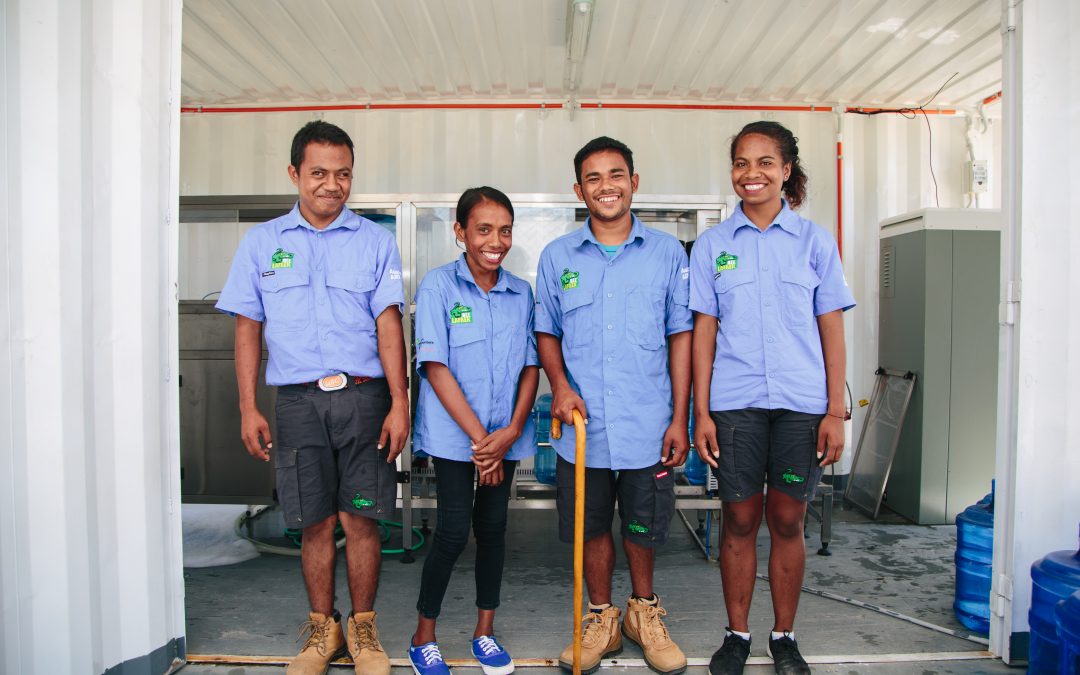Timor-Leste has what is described as a ‘youth bulge’. Almost 60% of the population of this relatively new nation are aged under 25. With increasing numbers entering the workforce every year, currently only around 11% are employed. (DFAT 2018) This is a difficult employment landscape, says Lewis Parish, project manager of Bee Lafaek, because there “are 14,000 graduates per year competing for a really limited pool of jobs.”
Bee Lafaek is piloting potable water kiosks in Timor-Leste, operated as small-scale enterprises by trained teams of young people. It is a model that has two overarching goals, says Lewis. “Providing people with safe potable water, and providing economic opportunities for youth.” For the youth involved it is also broadening their perspective on the kind of work opportunities they could have or could create – such as being self-employed. “The entrepreneurial activities that are part of this program are very useful,” agrees Lewis nodding “There is accounting, there is customer service, things that will be applicable to whatever career path these young people take in the future.”
An initiative of EWB Australia, and The Wise Foundation in partnership with CNEFP, the National Centre for Employment and Professional Training, the program also aims to be “an inclusive economic activity” for young people of all abilities, and engaged with RHTO, the National Disabilities Group. “We chose to involve these young people because they are good at their jobs, and they can participate,” says Lewis “and because this is not an opportunity that they would have otherwise got.”
Apolonia Santos agrees that finding work as a young Timorese with a disability is especially challenging saying “There is no opportunity for people with a disability.” Today she co-operates the Bee Lafaek ‘ANL Dinocin Dominia’ kiosk with her three colleagues Domingas Bere, Olandino Gomez, and Ecin Corte-Real Soares. They all have physical disabilities, and they all share the demoralizing experience of struggling to secure work. Before joining Bee Lafaek both Apolonia and Olandino say they were ‘hanging around at home doing nothing’, something which Olandino says made him feel, “so sad, with my disability I feel like I can’t do anything or contribute anything.”
Facilitated through the RHTO, Apolonia, Domingas, Olandino and Ecin were invited to join Bee Lafaek, and received training in kiosk operation, business management and customer service. Working together as a team they all agree has provided valuable collegial support, and they play to their individual strengths by coordinating responsibilities that respect each other’s disabilities.
Domingas says he is now inspired “to motivate another person with a disability and show to young people in Timor Leste how even with a disability, they can be effective and productive.” Olandino agrees, saying the team worried at the start that “we won’t be able to run a business with disabilities, but now the community accepts us and says to other young people, why can’t you do that?”
Lewis comes by regularly to check in with the team and support them with any issues, and sees firsthand the confidence they have gained through running the potable water enterprise. “They are proud about what they are doing,” he says smiling, “They serve as role models to their friends – they see them working, making money, helping to support their families, and they are inspired to do the same. I think there is a tremendous upside to that.”


